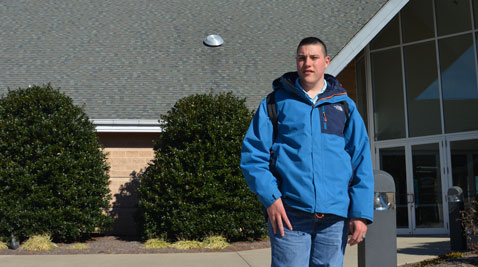FREDERICK – Like any mother of an active 20-year-old, Frederick County resident Michele Baisey has her hands full. But in addition to helping her son, Troy, balance school, work and home life, she faces a looming deadline that is unsettling for many parents in her position.
Troy Baisey, who was born prematurely, suffers from cerebral palsy and hearing loss. He is considered a “transitioning youth,” which means he will soon lose the guarantee of state assistance.
In Maryland, young adults with disabilities are entitled to public education until age 21. After that, families must apply for support through various programs and organizations. Services and financial assistance are contingent on eligibility requirements and the availability of funds.
It can be a frightening and overwhelming time for students with disabilities and their families, who are used to the structure and support of the public school system, said Mary Scott, a transition resource teacher for Baltimore County Public Schools.
“There’s no entitlement after you leave school,” Scott said. “It’s hard for parents to wrap their minds around that.”
Michele Baisey recalled the stress and pressure to complete multiple aid applications in a short amount of time starting when her son was a junior in high school.
“It was very overwhelming because it was so much all at once, and the applications are not short or by any means easy,” she said. “It’s looking back from birth and documenting and justifying everything medically … down to every doctor, every hospital, every medicine.”
As his mother navigates the state system, Troy Baisey is figuring out what he wants his future to look like. He had to modify his goals several times, like when he found out he would not be able to graduate high school with a diploma, or when he was told he may not be able to pursue his dream job of becoming a priest.

“I said I wanted to go into the seminary and [my support group] told me it wasn’t an option right now,” he said. “I wasn’t happy about it at first … so I just … shook off the bad attitude and I said ‘Okay I guess this is the right decision for right now and I’ll see where my journey ends up in the next couple years.’”
Troy Baisey’s uncle, Michael Baisey, is the marketing director for Service Coordination Inc., a nonprofit organization that connects disabled Marylanders with employment and other resources, and has helped his nephew evaluate his options. He said the transition period can be a challenging stage in life for anyone.
“You’re entering adulthood,” he said. “It’s a transition regardless of ability level, so I think when you are faced with additional challenges, it does increase the complexity.”
In Maryland, a special fund called the Governor’s Transitioning Youth Initiative, is specifically designated to help those in the Baiseys’ position. The Developmental Disabilities Administration estimates that nearly 600 individuals will receive assistance through the fund this fiscal year, said the administration’s acting director, Patrick Dooley. This year, more than $9 million was allocated to the fund, he said.
Troy Baisey and other developmentally disabled adults are only eligible to apply for the Governor’s Transitioning Youth Initiative fund between their 21st and 22nd birthdays, but once approved, funding continues for life, said Hannah Dutrow, his case worker at Service Coordination Inc.
But even with the promise of support from programs like the Governor’s Transitioning Youth Initiative, Michele Baisey said she still worries about the future.
“The older [Troy] gets and the more we get through this process, the more I do start to think about the future,” she said. “For [Troy] to be able to independently live on what is available to him right now I know wouldn’t be possible. That certainly is in the back of my mind moving forward.”
One way Troy Baisey is building his independence is through vocational training at SUCCESS, Frederick County’s secondary transition education program. He attends the special program in lieu of extending his high school education until age 21, and will receive a certificate of completion when he exits.
The SUCCESS program offers academic instruction and life-skills training to 18-to-21-year-olds with disabilities ranging from autism to developmental disabilities, said Program Administrator Katie Turner. It receives some state funding, and lobbies for the rest from the community and local businesses.
“Our goal is to create a program that allows them to be as independent as possible, and it looks different for each student,” said counselor Tracy Easterday. She said she has witnessed the struggles that students and their families face during the transition process.
“We are the last stop for parents, so we get quite a few parents that start to freak out a little bit,” she said. “We keep very open lines of communication.”
Turner said the challenges of navigating the system and transitioning into the adult world particularly affect students during the end of their time with SUCCESS.
“Parents have a lot of fears, especially that last year students are in our program,” she said. “You start to see a difference in the kids. They know they’re in their last year, and they feel it even though they might not be able to communicate it.”
For the Baiseys, the biggest asset has been a network of family and friends who have stood alongside them during this process.
“I had a lot of people help me,” Troy Baisey said. “Everybody was like working together like a team.”
His mother added: “Lots and lots of support … that’s really how you get through some days.”


You must be logged in to post a comment.